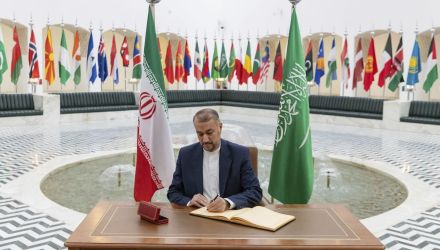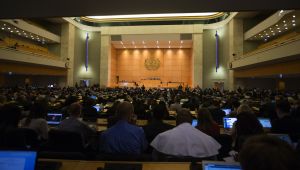In 1962, President John F. Kennedy famously predicted that "by 1970, there may be 10 nuclear powers instead of four and, by 1975, 15 or 20." Today, there are just 8. Why?
The single most significant factor that slowed the spread of nuclear weapons has been the Nuclear Nonproliferation Treaty (NPT) of 1968. Had the trend of 1962 continued, with states building nuclear arsenals as they acquired the technical capability to do so, Kennedy's prediction would have proved correct.
JFK's purpose in stating his provocative forecast was not fatalism. Rather, he sought to mobilize actions to prevent that result. He initiated negotiations that led to an array of arms-control agreements, including the Nuclear Nonproliferation Treaty.
That treaty struck a bargain: In return for other states forswearing nuclear weapons, the five original nuclear-weapons states pledged to share the benefits of peaceful nuclear technology with non-nuclear weapons states and to reduce their arsenals toward zero. Thanks to the nonproliferation regime, 183 nations today, including 40 that have the technical capability to build nuclear bombs, have renounced them.
In preparation for the 60th anniversary of the United Nations in 2005, Secretary-General Kofi Annan established a U.N. highlevel panel to consider looming global challenges. Among six principal threats to civilization in the quarter-century ahead, it gives primacy of place to nuclear Armageddon. Specifically, it warns that an "erosion of the nonproliferation regime could become irreversible and result in a cascade of proliferation."
The central challenger to the nonproliferation regime today is Iran. Over the past year, Iran has rushed to complete its nuclear facilities at Isfahan and Natanz. Despite Iran's claims that its intentions are "peaceful," the brutal fact is that the same cascade of centrifuges that can make low-enriched fuel for civilian nuclear reactors also can be used to produce highly enriched uranium to make nuclear bombs. This alarms the world, not least because of President Mahmoud Ahmadinejad's stated enthusiasm for wiping Israel off the map.
No one in the international community doubts that Iran's deeper objective is to build nuclear bombs. The U.N. Security Council, "concerned by the proliferation risks presented by the Iranian nuclear program," has demanded that Iran enter negotiations and suspend all activity related to uranium enrichment. Iran has rejected that demand, and the Security Council recently adopted sanctions aimed at persuading Iran to comply.
At this point, it may prove impossible to convince Iran to forgo its nuclear-weapons ambitions. For the international community to have a chance of doing so, however, it must address Iran's rationale for indigenous enrichment facilities. How, Iran asks, can it be confident of having fuel to power its nuclear reactors? Other states also worry that dependence upon foreign fuel suppliers leaves them vulnerable to blackmail.
Enter Warren Buffett. At a special meeting of the United Nations' International Atomic Energy Agency (IAEA) last July, former U.S. Sen. Sam Nunn put Buffett's check for $50 million on the table and challenged other countries to match it with $100 million. Buffett's purpose was to catalyze creation of a stockpile of nuclear fuel owned and controlled by the IAEA.
This "fuel reserve of last resort" would be the capstone of a multilayered insurance framework that would give states in compliance with NPT obligations the ability to buy fuel for reactors. These guarantees would expose the economic irrationality of a nation's choice to produce its own enriched fuel rather than buy it - since the cost of indigenous production is more than five times market prices.
This bold act of venture philanthropy is unusual but not unique. Buffett's friend, Bill Gates, previously has invaded the preserve of governments to promote health in developing countries. But leaders around the world have taken special note of this move by the Oracle of Omaha.
Over the past half-century, Buffett has become the world's most successful investor by assessing the odds and placing bets on companies he was confident would succeed. In this instance, Buffett aims to change the odds of an outcome by bending a proliferation trend he believes will otherwise lead to catastrophe.
Buffett's initiative puts the ball squarely in the court of George W. Bush and Vladimir Putin. The United States and Russia now must rise to the challenge, match Buffett's gift and empower the international community to stop Iran.
The writer is a professor of government at Harvard University, where he is director of the Belfer Center for Science and International Affairs. He was an assistant secretary of defense during the first term of the Bill Clinton administration.
Allison, Graham. “Buffett's Gamble Tips the Odds Toward Nuclear Nonproliferation.” Omaha World-Herald, December 31, 2006




